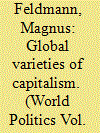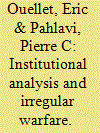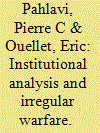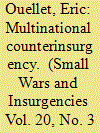|
|
|
Sort Order |
|
|
|
Items / Page
|
|
|
|
|
|
|
| Srl | Item |
| 1 |
ID:
162289


|
|
|
|
|
| Summary/Abstract |
The Brazilian government aims to increase the share of biofuels in the energy mix to around 18% by 2030, which implies an increase of ethanol production from currently 27 bln liters to over 50 bln liters per year. Biofuel policies play an important role in ethanol production, consumption, and investment in processing capacity. Nevertheless, a clear understanding of how current policies affect the evolution of the market is lacking. We developed a spatially-explicit agent-based model to analyze the impact of different blend mandates and taxes levied on gasoline, hydrous, and anhydrous ethanol on investment in processing capacity and on production and consumption of ethanol. The model uses land use projections by the PCRaster Land Use Change model and incorporates the institutions governing the actors’ strategic decision making with regard to production and consumption of ethanol, and the institutions governing the interaction among actors. From the investigated mix of policy measures, we find that an increase of the gasoline tax leads to the highest increased investments in sugarcane processing capacity. We also find that a gasoline tax above 1.23 R$/l and a tax exemption for hydrous ethanol may lead to doubling the production of ethanol by 2030 (relative to 2016).
|
|
|
|
|
|
|
|
|
|
|
|
|
|
|
|
| 2 |
ID:
165597


|
|
|
|
|
| Summary/Abstract |
This article analyzes the prospects for globalizing the varieties of capitalism (voc) debate. It identifies and compares firm-centered, governance-centered, and state-centered approaches to extending the debate on capitalist diversity, and discusses the distinctive contributions of each approach as well as the trade-offs between them. The author draws on three agenda-setting volumes that engage with the voc framework and study capitalist diversity in three regions not usually covered by this literature: Latin America, East and Southeast Asia, and East Central Europe. As these regions play an increasingly important role in the world economy, this article examines what the books imply about the current state of knowledge about global voc. The author argues that the extension of the voc debate to these parts of the world is important for advancing the understanding of economic institutions; the approach can reinvigorate research on capitalist diversity and the institutional foundations of economic development in the current era of globalization.
|
|
|
|
|
|
|
|
|
|
|
|
|
|
|
|
| 3 |
ID:
117636


|
|
|
|
|
| Publication |
2012.
|
| Summary/Abstract |
We examine the determinants of the likelihood and duration of grain bank survival using survey data from Orissa. The study is motivated by the fact that a large share of grain banks have ceased to function over time. It is also motivated by the fact that despite the high rate of failure, the Government of India and rural development non-governmental organisations are continuing to scale up their grain bank activities. We find that village characteristics appear to matter for both the likelihood and duration of grain bank survival, whereas grain bank member characteristics and grain bank institutional features largely do not appear to matter. The findings suggest the salience of programme placement for grain bank sustainability.
|
|
|
|
|
|
|
|
|
|
|
|
|
|
|
|
| 4 |
ID:
108710


|
|
|
|
|
| Publication |
2011.
|
| Summary/Abstract |
This article proposes a case study to illustrate the usefulness of sociological institutional analysis as a method to uncover 'blue force' challenges to deal with irregular warfare. The French Army's adaptation to revolutionary warfare in Algeria, starting in 1954, is used to illustrate both the application of the methodology and how institutional forces can hinder as well as overwhelm transformation for irregular warfare. The analysis emphasizes three key dimensions of the French Army's institutional adaptation: the regulative, normative and cognitive. These empirical elements are used to show how they interacted and influenced the institutional implementation of the French COIN structures.
|
|
|
|
|
|
|
|
|
|
|
|
|
|
|
|
| 5 |
ID:
109952


|
|
|
|
|
| Publication |
2012.
|
| Summary/Abstract |
The new attention paid to 'small wars' does not seem to translate into a better adaptation of conventional armed forces to this type of conflicts. As illustrated by the IDF's inability to get a decisive edge against the Hezbollah during the 33-Day War, Israel is no exception to such difficulty to adapt. A number of analysts have concluded that, victim of its long experience gained through the Intifadas, Israel 'over-adapted' to irregular warfare. Applying a sociological framework inspired by the seminal work of Richard Scott, this study suggests that this view is, at best, arguable. Going beyond the classical military explanations by uncovering key sociopolitical forces that have shaped the Israeli defense institutions, this study proposes that the combination of a post-heroic society and unbalanced civil-military relations have led the Israeli military institution to opt for a conventional posture articulated around technocentric tenets, which are ultimately disregarding the true nature of the asymmetrical challenge presented by the Hezbollah.
|
|
|
|
|
|
|
|
|
|
|
|
|
|
|
|
| 6 |
ID:
153390


|
|
|
|
|
| Summary/Abstract |
Xi Jinping swiftly centralized political power shortly after the 18th Chinese Communist Party (CCP) National Congress in 2012, opposing what was predicted when he was elected general secretary. This action also compromises China’s long-term efforts to avert an over-concentration of power among a few elites. This study deals with Xi’s strong ascent to power, defined as the result of institutional change in China’s political power game from the perspective of new institutionalism. The author identifies triggers of institutional change, ideas and norms introduced for changing informal institutions, and the actual transformation of formal institutions, arguing that Xi took advantage of social demand for reform coordination as well as some top elites’ serious political misbehavior to commence institutional change for the centralization of political power. To do so, Xi introduced new reform ideas – systemic thinking and top-down design, originating from complex systems theory – in the name of coordinating and comprehensively deepening reform. Xi eventually succeeded in justifying the centralization of power and the establishment of central organizations to deepen reforms comprehensively and coordinate internal and external security. As a result, Xi seized power while practically nullifying the principle of division of work.
|
|
|
|
|
|
|
|
|
|
|
|
|
|
|
|
| 7 |
ID:
166477


|
|
|
|
|
| Summary/Abstract |
The transportation sector is one of the sustainable development wheels that requires a lot of energy to operate, therefore it is concerned as one of the main factors in greenhouse gas emissions and global warming. In Iran, like rest of the world, the light-duty vehicles are the effective factors in the pollution of the metropolitan cities. Although the management of their fuel consumption is a vital action in decreasing the cost and air pollution, that's inextricable link with the public welfare and the economy of the car manufacturers creates barriers. An accurate analysis concerning the barriers to reducing the fuel consumption can be obtained by using the game theory method in the light-duty vehicles. For this purpose, the effective factors including the people, car manufacturer and government are modeled and their utility are considered. By examining the relationships among the players and their actions we can conclude that the penalty option can significantly help the management of the fuel consumption. Also, forcing the government to lend to the car manufacturer to improve the fuel consumption of motor vehicles reduces fuel consumption. In addition, standard setting for the average fuel consumption of the producing cars should be staged and stepped.
|
|
|
|
|
|
|
|
|
|
|
|
|
|
|
|
| 8 |
ID:
133542


|
|
|
|
|
| Publication |
2014.
|
| Summary/Abstract |
A number of observers have expressed serious concerns that Al-Qaeda in the Islamic Maghreb (AQMI), as it expands in the Sahel, may become strong enough to be a threat to Europe and carry on the global mission of Al-Qaeda as conceived by bin Laden. This fear seems unwarranted. Using institutional analysis to study the AQMI behavioral fluctuations over the last decade, this article argues that AQMI's need to find a compromise between external and internal legitimacy has constrained its behavior. The affiliation of the Algerian terrorists with Al-Qaeda was in many ways a marriage of convenience that created a number of internal contradictions. At the cognitive level, implicit Algerian nationalism to rid the country of its corrupt regime remains at odds with pan-Islamic views shared by Al-Qaeda's leadership. At the normative level, indiscriminate suicide bombing supported by Al-Qaeda is abhorrent to many Algerian terrorists, who construe their mandate in the spirit of the Algerian war of independence where it is their duty to protect civilians. These and other contradictions prevent AQMI from developing a coherent political agenda and thus it is less likely to engage in a long-term conflict against European societies.
|
|
|
|
|
|
|
|
|
|
|
|
|
|
|
|
| 9 |
ID:
136191


|
|
|
|
|
| Summary/Abstract |
We examine the challenges and opportunities to introduce emissions trading (ETS) in China’s electricity sector, in which the interaction between ETS and electricity market reform plays a major role. China’s electricity sector is currently in a slow progress towards a more competitive and market-based system. Both equal share dispatching policy and regulated wholesale and retail pricing policies pose significant challenges for implementation of ETS in China’s electricity sector. One of the important points of ETS is to give a price for carbon emissions and establish a cost pass-through mechanism (reminded that the essential of carbon pricing is to put a price on carbon emissions that is equal to discounted value of the external damages). It should be regarded as a part of broader policy package for energy and resources price reform. This will require that any low-carbon power policy should be considered as a part of whole policy package aiming at further liberalizing the electricity sector in China. Three policy options are identified to incorporate ETS with electricity reform under different circumstances. A combination of those three options is also proposed to break the lock and reinforce the positive interaction between ETS and the transition towards a competitive electricity system, in link with current pilot ETS designs. A roadmap to introduce ETS in a stepwise manner is suggested.
|
|
|
|
|
|
|
|
|
|
|
|
|
|
|
|
| 10 |
ID:
092307


|
|
|
|
|
| Publication |
2009.
|
| Summary/Abstract |
This article proposes a case study of the multinational counterinsurgency operations that occurred in China during the Boxer Rebellion in 1900-1, to provide a better understanding of the political and military dynamics specific to this type of mission. The study focuses primarily on the nature of the cooperation on the ground, the various national approaches to counterinsurgency, and the asymmetry of strategic approach between the Westerners and the Chinese. A discussion is also proposed, highlighting that combined counterinsurgency is not per se an obstacle to the unity of command, but that politically international coalitions create unique challenges to counterinsurgency operations.
* Views and opinions expressed in this text are those of the author and do not represent, or otherwise reflect, any official opinion or position of the Department of National Defence or the Government of Canada. Reproduced with permission of the Department of National Defence, Government of Canada.
|
|
|
|
|
|
|
|
|
|
|
|
|
|
|
|
| 11 |
ID:
174988


|
|
|
|
|
| Summary/Abstract |
Fostered by environmental and economic drivers, liquid biofuels are expanding in the global energy matrix. However, many countries with biofuel potential, such as Guatemala, have yet to develop domestic biofuels markets. During the last decade, ethanol production in Guatemala has increased significantly, yet a domestic market does not appear to be in the horizon. It is a kind of paradox: a world class sugarcane producer and ethanol exporter does not use any blend of ethanol and gasoline in vehicles. This paper presents a techno-economic analysis and review of barriers that have delayed ethanol-gasoline blends in Guatemala. The cost assessment considers data from an existing distillery in Guatemala. Results show that Guatemala could produce annually a maximum of 250 million liters of ethanol from molasses, more than the amount required to introduce E10. For the current conditions, results from the modelling indicate that the cost of ethanol has minimal impact on the price of E10, but taxes could represent one third of the cost of E10 at the retail level. Since supply conditions are favourable and technical barriers are not relevant, strong government intervention and a coherent price structure for ethanol-gasoline blends is needed to create an ethanol market in Guatemala.
|
|
|
|
|
|
|
|
|
|
|
|
|
|
|
|
|
|
|
|
|